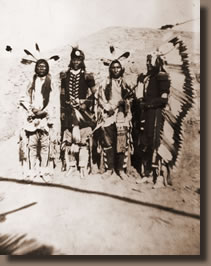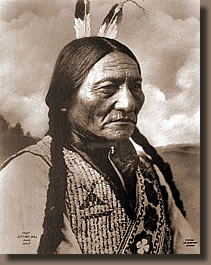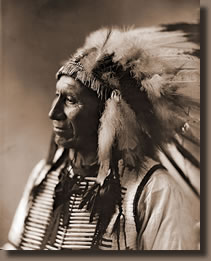| The
whites told only one side. Told it to please themselves. Told much that
is not true. Only his own best deeds, only the worst deeds of the Indians,
has the white man told.
— Yellow Wolf of the Nez Percés, 1879
________________________________________________
Since the time of his youth, Crazy Horse (Tashunka Witko) had known
that the world men lived in was only a shadow of the real world. To
get into the real world he had to dream, and when he was in the real
world everything seemed to float or dance. In this real world his horse
danced as if it were wild or crazy, and this was why he called himself
Crazy Horse. He had learned that if he dreamed himself into the real
world before going into a fight, he could endure anything.
— Dee
Brown, "Bury My Heart at Wounded Knee"
__________________________________________________________________
About the Earth
___________________________________________________________________
Every part of this soil is sacred in the estimation of my people. Every
hillside, every valley, every plain and grove has been hallowed by some
sad or happy event in days long vanished.
Even the rocks, which seem to be dumb and dead as they swelter in the
sun along the silent shore, thrill with memories of stirring events
connected with the lives of my people. And the very dust upon which
you now stand responds more lovingly to their footsteps than to yours,
because it is rich with the blood of our ancestors and our bare feet
are conscious of the sympathetic touch.
— Chief
Seattle of the Suquamish, 1853
________________________________________________
The earth is part of our body, and we never gave up the earth.
— Toohoolhoolzote,
Wallowa prophet, 1877
________________________________________________
The earth was
created by the assistance of the sun and it should be left as it was...
The country was made without lines of demarcation, and it is no man's
business to divide it... The one who has the right to dispose of it
is the one who has created it.
—
Heinmot
Tooyalaket (Chief Joseph) of the Nez Percés, 1879
________________________________________________
We know that
the white man does not understand our ways. One portion of the land
is the same to him as the next, for he is a stranger who comes in the
night and takes from the land whatever he needs. The earth is not his
brother, but his enemy —and when he has conquered it, he moves on.
—
Chief
Seattle of the Suquamish, 1853
________________________________________________
Of the 3,700,000
buffalo destroyed from 1872 through 1874, only 150,000 were killed by
Indians. When a group of concerned Texans asked General (Philip) Sheridan*
if something should not be done to stop the white hunters' wholesale slaughter,
he replied: "Let them kill, skin and sell until the buffalo is exterminated,
as it is the only way to bring lasting peace and allow civilization to
advance."
— Dee
Brown, "Bury My Heart at Wounded Knee"
*
General
Sheridan is also credited for the infamous phrase: "The only good Indians
I ever saw were dead."
___________________________________________________________________
About
Religion
___________________________________________________________________
We understand
that your religion is written in a book. If it was intended for us as
well, why has not the Great Spirit given it to us? Why did He not give
to our forefathers the knowledge of that book, with the means of understanding
it rightly?
Brother, you
say there is but one way to worship and serve the Great Spirit. If there
is but one religion, why do you white people differ so much about it?
Why not all agree, as you can all read the book?
Brother, the
Great Spirit has made us all. But He has made a great difference between
His white and red children. He has given us a different complexion and
different customs. Since He has made so great a difference between us
in other things, why may we not conclude that He has given us a different
religion, according to our understanding?
Brother, we
do not wish to destroy your religion or take it from you. We only want
to enjoy our own.
—
Chief
Red Jacket of the Seneca, 1805
________________________________________________
Your religion
was written upon tablets of stone by the iron finger of your God so
that you could not forget. The red man could never comprehend nor remember
it.
Our religion
is the traditions of our ancestors —the dreams of our old men, given
to them in the solemn hours of night by the Great Spirit and the visions
of our sachems— and is written in the hearts of our people.
—
Chief
Seattle of the Suquamish, 1853
________________________________________________
We do not want
churches because they will teach us to quarrel about God. We do not
want to learn that. We may quarrel with men sometimes about things on
this earth, but we never quarrel about the Great Spirit. We do not want
to learn that.
—
Heinmot
Tooyalaket (Chief Joseph) of the Nez Percés, 1873
________________________________________________
Your dead cease
to love you and the land of their nativity as soon as they pass the
portals of the tomb and wander way beyond the stars. They are soon forgotten
and never return.
Our dead never
forget the beautiful world that gave them being. They still love its
verdant valleys, its murmuring rivers, its magnificent mountains, sequestered
vales and verdant-lined lakes and bays, and ever yearn in tender, fond
affection over the lonely-hearted living, and often return from the
Great Beyond to visit, guide, console and comfort them.
And when the
last red man shall have perished and the memory of my tribe shall have
become a myth among the white men, these shores will swarm with the
invisible dead of my tribe.
At night, when
the streets of your cities and villages are silent and you think them
deserted, they will throng with the returning hosts that once filled
them and still love this beautiful land. The white man will never be
alone.
Let him be
just and deal kindly with my people, for the dead are not powerless.
Dead, did I say? There is no death. Only a change of worlds.
—
Chief
Seattle of the Suquamish, 1853
___________________________________________________________________
About
the Land
___________________________________________________________________
Sell a country!
Why not sell the air, the clouds, and the great sea? Did not the Great
Spirit make them all for the use of his children?
—
Tecumseh
(Crouching Tiger), Shawnee General
________________________________________________
I was born on
the prairies where the wind blew free and there was nothing to break
the light of the sun. I was born where there were no enclosures. I was
living peaceably when people began to speak bad of me. I want to know
now who it was ordered me to be arrested. I was praying to the light
and to the darkness, to God and to the sun, to let me live quietly with
my family.
—
Goyathlay
(Geronimo) of the Chiricahua Apache, 1885
________________________________________________
If a man loses
anything and goes back and looks carefully for it he will find it, and
that is what the Indians are doing now when they ask you to give them
the things that were promised them in the past. And I do not consider
that they should be treated like beasts, and that is the reason I have
grown up with the feelings I have.
I feel that
my country has gotten a bad name, and I want it to have a good name.
It used to have a good name, and I sit sometimes and wonder who it is
that has given it a bad name.
—
Tatanka
Yotanka (Sitting Bull) of the Teton Sioux, 1883
___________________________________________________________________
About
the Wounded Knee Massacre
___________________________________________________________________
When the madness
ended, Big Foot and more than half of his people were dead or seriously
wounded; 153 were known dead, but many of the wounded crawled away to
die afterward. One estimate placed the final total of dead at very nearly
300 of the original 350 men, women and children.
It was the
fourth day after Christmas in the Year of the Lord 1890. When the first
torn and bleeding bodies were carried into the candlelit church, those
who were conscious could see Christmas greenery hanging from the open
rafters. Across the chancel front above the pulpit was strung a crudely
lettered banner: PEACE ON EARTH, GOOD WILL TO MEN.
—
Dee
Brown, "Bury My Heart at Wounded Knee"
________________________________________________
There was a
woman with an infant in her arms who was killed as she almost touched
the flag of truce, and the women and children of course were strewn
all along the circular village until they were dispatched. Right near
the flag of truce a mother was shot down with her infant; the child
not knowing that its mother was dead was still nursing, and that especially
was a very sad sight. The women as they were fleeing with their babes
were killed together, shot right through, and the women who were very
heavy with child were also killed. All the Indians fled in these three
directions, and after most all of them had been killed a cry was made
that all those who were not killed wounded should come forth and they
would be safe. Little boys who were not wounded came out of their places
of refuge, and as soon as they came in sight a number of soldiers surrounded
them and butchered them there.
—
American
Horse of the Oglala Sioux, 1891
________________________________________________
I did not know
then how much was ended. When I look back now from this high hill of
my old age, I can still see the butchered women and children lying heaped
and scattered all along the crooked gulch as plain as when I saw them
with eyes still young. And I can see that something else died there
in the bloody mud and was buried in the blizzard. A people's dream died
there. It was a beautiful dream. And I, to whom so great a vision was
given in my youth, —you see me now a pitiful old man who has done nothing,
for the nation's hoop is broken and scattered. There is no center any
longer, and the sacred tree is dead.
—
Hehaka Sapa (Black Elk), Medicine Man of the Oglala Sioux, 1931
________________________________________________
Shortly after the
Wounded Knee Massacre in 1890, members of the 7th Calvary were awarded
Medals of (dis)Honor for their "valiant efforts" in defense of what has
come to be known as the Great American Way. Please sign
the petition to rescind those medals:

________________________________________________
If you want
to learn more about the Wounded Knee Massacre, I suggest that you visit:
| 





